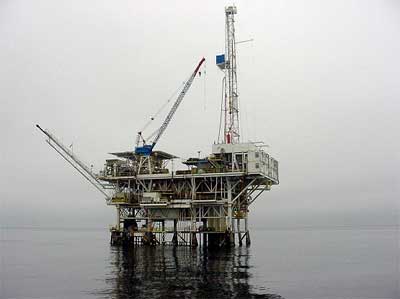Governor Signs Rigs-to-Reefs Bill
Controversial Proposal to Allow Offshore Oil Platforms to Remain Once Dead Becomes Law

After being debated for decades, the proposal to turn offshore oil rigs into underwater reefs for the benefit of marine life is now a California law. That means that, when a rig is decommissioned, oil companies can ask the state to assess the environmental benefits of leaving a portion of it in place. If the state determines there is a net benefit, then a portion of the savings — which would amount to as much as $650 million for the state’s 27 rigs — would be kicked from the oilers back to the state coffers.
Governor Arnold Schwarzenegger signed the bill on Thursday night after it sailed through the statehouse with very little opposition. In fact, the bill, which was authored by the Speaker of the House John Pérez, nearly passed unanimously; only three state legislators voted against the measure, one of whom was Santa Barbara’s Assemblyman Pedro Nava.
Proponents — including scientists who’ve seen abundant marine life on the rigs, politicians who believe the financial windfall will help the budget-strapped state, recreational fishermen who hope to capture the increasing underwater bounty, and oil companies who stand to save millions — are hailing the law as a victory for marine resources. It was also supported by Audubon California, California League of Conservation Voters, the Monterey Bay Aquarium, Ocean Conservancy, Oceana, and The Nature Conservancy.
“This law creates a legacy program for our state’s marine resources,” said Barry Broad, president of the Coalition for Enhanced Marine Resources in a prepared statement. “It preserves the life on the platforms, provides the certainty needed for platform operators to begin the decommissioning and removal process and generates hundreds of millions of dollars specifically for marine programs.”
Opponents — namely, commercial fishermen who worry their gear will snag on underwater debris and environmentalists who believe the bill is a boondoggle for the oil industry — are crying foul. Of the state’s 27 rigs, 20 are located in the Santa Barbara Channel, so the S.B.-based Environmental Defense Center has traditionally been the loudest critic of this plan. “We’re naturally disappointed,” said the EDC’s Linda Krop on Friday upon learning the news. “We think the legislation is misguided and based on assumptions that are not supported by any scientific evidence.”
Krop pointed to a recent state report that highlighted the gaps in information. “We take exception to the assumption that the platforms provide a benefit to the environment when, in fact, there is no scientific consensus on that,” she said. “We also take great exception to the statement that it will encourage platform operators to decommission earlier. All of these platforms are in federal waters, and federal law does not permit that.”
The EDC does not have any plans to sue over the bill, however, because it calls for platforms to be analyzed on a case-by-case basis. “It would be premature to bring any challenge now,” said Krop, who said the future opposition would arise when oil companies apply to leave their rigs in place. “We definitely will be monitoring this as platforms are ready to be decommissioned.”
According to a recent survey, some rigs may be ready for decommissioning as soon as 2015.



